
Bitcoin is already using clean energy.
Televisions, airplanes, and Christmas lights all require energy to work properly. What makes you think a censorship-resistant, efficient, global payment network doesn't?
Common myths about Bitcoin's energy use
In the days following the Ethereum Merge, critics have been pointing to Bitcoin's energy use as the leading cause of pollution - as you will see, these myths are not true.
Myth: Bitcoin uses as much energy as <country>
There is no correlation between Bitcoin price and its energy use (see What determines Bitcoin's Price? by Investopedia. Energy use is not listed as a factor.)
The IT, plane, car, transportation, and other industries must utilize large amounts of electricity for data centers, chemical or fuel generation, or heating, in order to provide their services. The same is true for Bitcoin.
Bitcoin needs to use a lot of energy so that its Proof of Work can prevent hackers from stealing people's bitcoins. So far it's been going great, compared to several Proof of Stake coins, which have been breached with 51% attacks.

Some people claim "We know crypto doesn’t need much energy to work." This is very ignorant because freedom from censorship is only possible in Proof of Work - transactions can still be embargoed in other algorithms.
Case study: America's electronics use more energy than Bitcoin
In 2019, the Cambridge Bitcoin Electricity Consumption Index (CBECI) collected data showing that devices kept on standby (sleep mode), in the United States alone, use as much energy as the Bitcoin network in an entire year.
Imagine the energy consumption when they are running.
Or when other countries' devices are added.
Or when this year's data is analyzed.
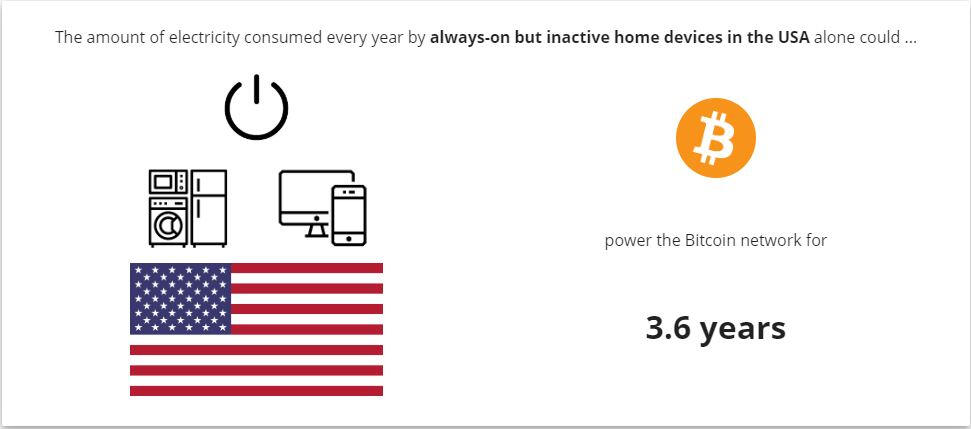
Myth: Proof of Stake is a problem-solving silver bullet
Proof of Stake (PoS) uses a lot less energy than Proof of Work (PoW). However:
Proof of Stake increases centralization risk - The top 2 staking pools control almost 50% of the staked coins between them*, increasing the risk of transaction censorship.
Staking participants can't just stop staking with a malicious pool because the pool is likely to have more crypto to offset the loss. This cannot happen in Proof of Work.
It is likely that companies in charge of staking pools might misappropriate funds to collateralize loans. If these loans are defaulted on, you might lose your crypto to bankruptcy.
*Data correct as of September 20, 2022. The top 5 Ethereum staking pools were: Lido Finance with at least 31% of coins, Coinbase at 14.7% of coins, Kraken at 8.5% of coins, Binance at 6.6% of coins, and staked.us at about 3% of coins. Source: CNBC
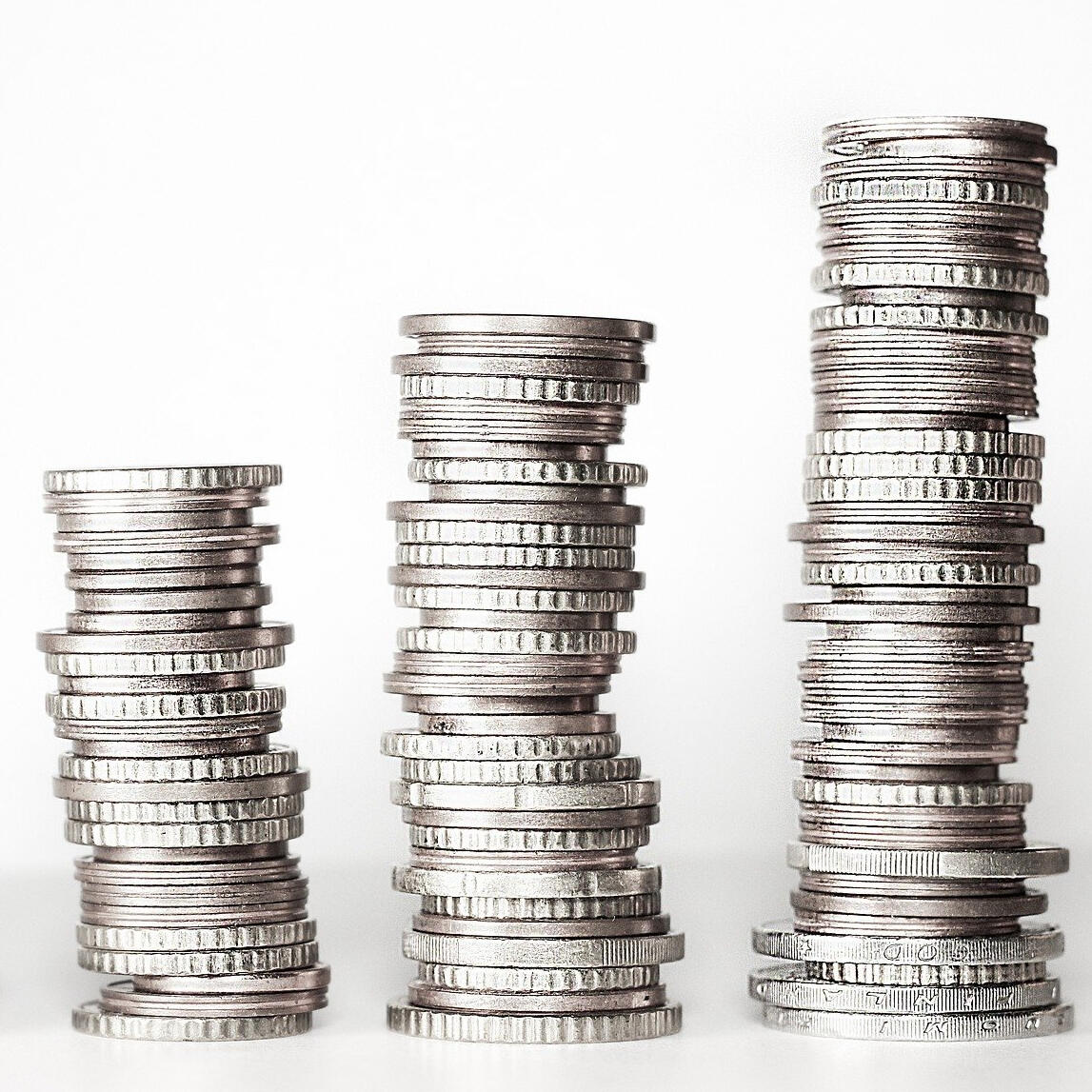
On the contrary, Proof of Work has proven to be censorship-resistant:
Miners can easily prevent 51% attacks by leaving mining pools that grow too large - this has prevented centralization on at least one occasion.
Hashpower is not money, so mining pools cannot misappropriate it for other uses.
Miners can stop their operations any time they like.
Bitcoin mining has the potential to incentivize other industries to switch to green energy.
Bitcoin improves the efficiency of the energy industry. It can help prevent Renewable Curtailment as well as making it profitable to capture gas otherwise destined to be burned in gas flaring which encourages producers to reduce carbon emissions. Low-carbon energy projects such as hydroelectric, nuclear or renewables can be made profitable by selling the excess energy produced to the mining of bitcoin.
A very large part of the energy produced is not used correctly, partly because it is wasted in unprofitable ways, such as dispersion in networks or thermal dispersion in endothermic engines. This is partly because it is produced in places or moments where the energy is not necessary, such as in power plants and off-peak nuclear power plants. In this space, Bitcoin can make a huge contribution by efficiently using resources that would otherwise be wasted.
In 2019, rejected energy accounted for over two-thirds of all electricity generation. Bitcoin mining incentivizes the development of more efficient generation processes, to generate electricity that is sold to Bitcoin miners on a later date. This ultimately reduces the amount of fossil fuels used, and subsequently burnt into the atmosphere.
Bitcoin mining can clear the queue of on-hold renewable projects in the United States and other countries by allowing the electric utilities to make back their expenses by selling renewable-powered electricity to miners after project completion.
Don't take our word for it - watch this video from Ian Major from All Things Bitcoin, explaining how Proof of Work can help the environment:

Proof of Work (PoW)...
How it works in theory:
Everyone can build blocks of transactions.
Appending blocks requires spending of computational power to solve a math problem.
There's no way to know if a block will eventually be appended to the blockchain.
All blocks have the same computational difficulty for appending them to the blockchain.
The network decides what the difficulty is going to be.
Whoever solves the math problem first can append their block and claim the bounty.
The block difficulty changes based on the average time it takes to solve the math problem over several days.
...versus Proof of Stake (PoS)
How it works in theory:
Everyone can build blocks of transactions.
Candidates who want their block to be appended lock up their funds.
The candidate is also the voters - the candidate casts the votes for itself.
A voter is simply a financial bond with a digital signature
The greater the bond, the more the votes. So one voter can have a more votes than others.
In other words, candidates vote with their money. More "staked" money implies more votes.
The block with the most votes can be appended to the blockchain and its candidate can claim the bounty.
It's easy to see how Proof of Stake can quickly become unfair and unsafe.
It leads to a monopoly in block building.
Imagine if elections allowed some people to have more votes than others because they have more money. That would surely cause an uproar. Yet, this is exactly what Proof of Stake is all about.
Rich people with a large stake will append most of the blocks, so the rich will get richer, and the poor poorer (locked funds cannot be spent on other things).
It is easier to carry out a 51% attack.
A 51% attack is when malicious miners make transactions that steal coins from other addresses and put them in the longest chain. This is only possible when malicious miners have more than half of the mining power.
This affects all cryptocurrencies, but especially those that use Proof of Stake, because there is an easier way that doesn't even need 51% of the mining power (Nothing-at-stake).
In Proof of Work, you have to pay your electricity bills whether you are mining a good chain or an evil chain. This discourages miners from creating evil, coin-stealing blocks, since electricity quickly becomes expensive. But as you can see in the following diagrams, there's no criminal penalty in pure Proof-of-Stake, so in theory it's possible to steal coins on PoS chains even if a miner has only 1% of total mining power.
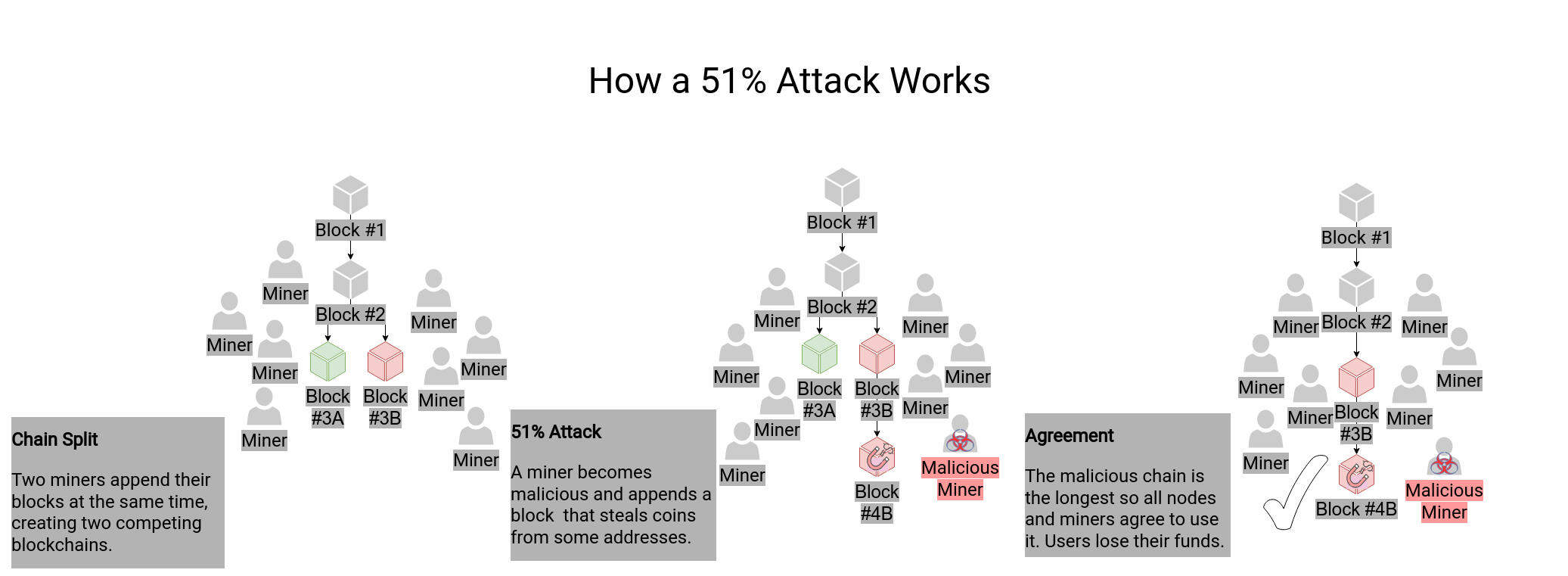
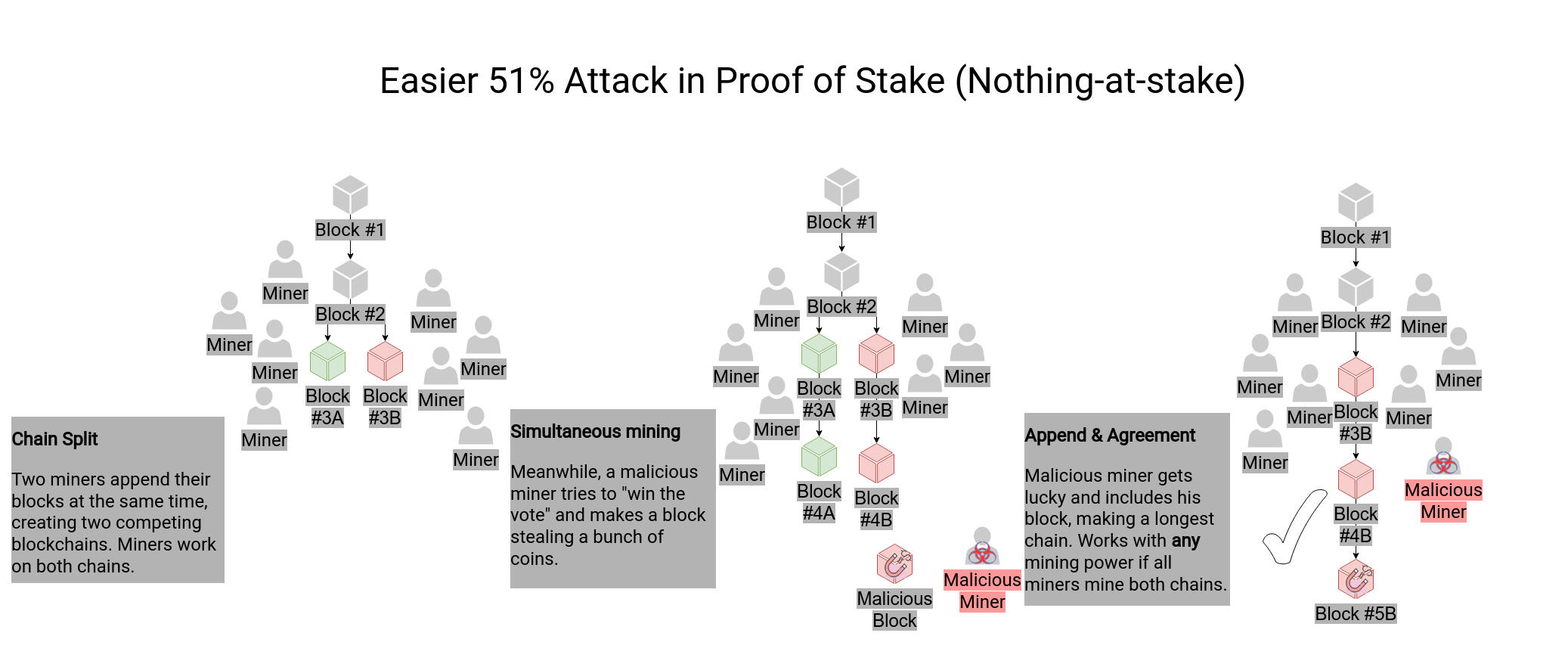
Ethereum's Proof of Stake solved this, but has a different problem
Ethereum forces miners to lock up ETH in the network as collateral to get block rewards. This collateral is destroyed if miners attempt to append evil blocks.
What is and what is not an evil block is determined by a special type of node called slasher nodes. The slasher node is supposed to report the bad block to the network to enforce the punishment.
At least 1 slasher should be running at all times. Since they use a lot of resources, they're usually ran by big businesses.
The problem is that the network doesn't exactly define what constitutes an evil block. So slashers are actually free to report any block that they want.
This presents a serious problem if the big businesses operating the Ethereum slasher nodes start cooperating with law enforcement to censor transactions - it will turn Ethereum into another bank.
They made a complex solution to attempt to fix a basic flaw, that doesn't completely fix the problem. At this point, this ceases to be about a "basic software code change" - if it was like that, then an undergraduate could code it in a week.
Why is Proof of Stake a bad idea for Bitcoin?
Bitcoin uses a development system called BIP documents to make changes to the protocol that affect all Bitcoin users. They are roughly equivalent to the Internet Engineering Task Force's RFC documents.
A majority of the Bitcoin community must agree with a BIP before it gets implemented. However, what usually happens to most proposals is that the disagreements are never settled, and a fork is created with the change. Historically, all forks have had only a fraction of Bitcoin's user adoption.
Such an agreement has not been reached for the use of Proof of Stake in Bitcoin. In fact, a majority of users are opposed to this change because Proof of Stake is not approved by the Bitcoin community due to the drawbacks that are explained above.
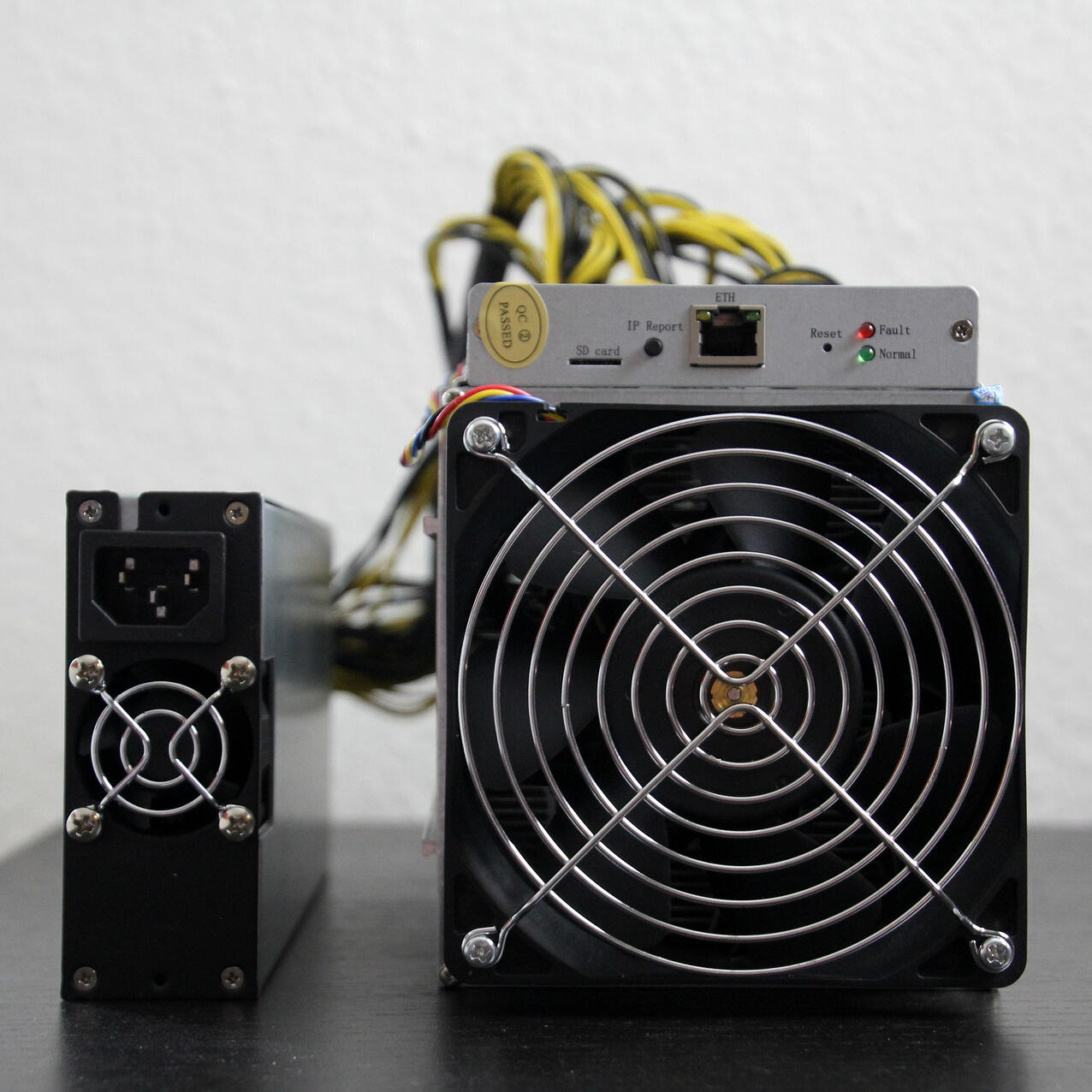
For instance, Bitcoin was forked in 2020 to implement basic PoS. It was supposed to gain traction among PoW critics but utterly failed at sustaining even a modest userbase.
This demonstrates that Bitcoin itself will fall down a similar spiral if it attempted to force a change to any kind of PoS.

Greenpeace is attempting to force Proof of Stake into Bitcoin.
Misguided environmental activists and their organizations are lobbying Congress to ban Proof of Work.
And while that is stalling, they are attempting to misguide more gullible people into supporting a Proof of Work ban using their own call-to-action website CleanupBitcoin.com.
This is a foolhardy action to take considering the extreme risk of block abuse and censorship that is possible in the Proof of Stake process, problems which are plaguing other Proof of Stake coins.
That is not to mention that none of these people have even bothered to submit a BIP about formally implementing Proof of Stake.
Bitcoin and its full-node implementation Bitcoin Core have a long history of thoroughly reviewing changes before they are committed and deployed, to prevent subtle vulnerabilities from entering the network in the first place, as they have in other major coins.
Attempting to force the hands of developers in reaction to banning Proof of Work is not the solution to external problems which are not directly caused by Bitcoin and Proof of Work.
We must show them that Proof of Stake is the wrong and dangerous solution for Bitcoin's energy problem.
We must also show all detractors that the correct way to make a change to the Bitcoin protocol is by writing a Bitcoin Improvement Proposal, not by making a fuss about it on the media.
Stop Bitcoin Eco-Shaming Now
It's time for all bitcoiners to rise up and defend their currency from external threats.
Show your solidarity to Bitcoin even if it's just a tweet. Share hashtags #EcoFriendlyPoW and #EndTheFUD.
Share this website on social media, on forums, and in emails, documents, and presentations.
Write to your MP, senator, or member of Congress explaining the benefits of Proof of Work mining for the environment. Here are some letter templates you can fill in.
If you have writing or journalistic skills, write a small essay about the facts of Proof of Work and climate change, and then email newspapers or online publications you frequent asking them to publish it as a guest post.
Post in comments sections of news articles spreading fake news about PoW, writing the real facts inside your comment. Ideally, link back to this website too.
If you have or aspire to get video creation skills, make a short informational YouTube video about energy stats of Bitcoin mining - make sure you compare the energy of mining to other, more energy-consuming stuff like factories. Also don't forget to link back to this site. Here is a list of common video editing software.
Tell your friends and colleagues the real facts about Proof of Work mining, and direct them to this website. You can also post about this on social media.
Start a meetup with people in your community, or join an existing one, to share the real proportion of energy used in Bitcoin mining.
If you have good speaking skills, host a seminar about how useful Bitcoin mining can be to accelerate renewable energy adoption.
Write an email and make a phone call to Greenpeace explaining why forcing a switch to Proof of Stake is a disastrous idea. Make sure you send it to all of their regional offices. We made a email template for Greenpeace and other organizations & individuals which you can use here. If you want, you can also send it as a Twitter DM.
Similarly, email or DM it to all crypto personalities, from famous people like Jack Dorsey and Elon Musk to exchange owners, traders, podcasters, event organizers, and the guy who runs that Bitcoin ATM around the block.
If you are having trouble finding interested people, browsing the "Following" lists of prominent Bitcoin Twitter accounts might help.

